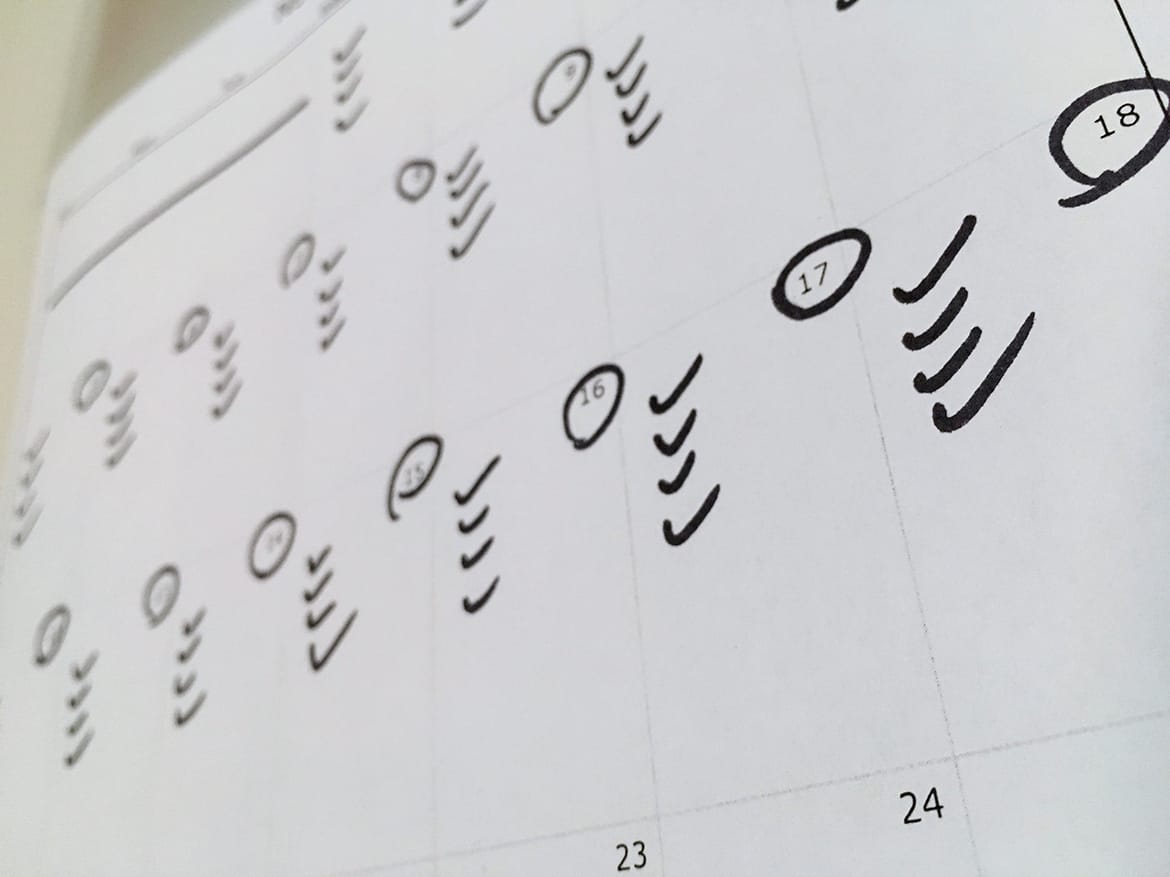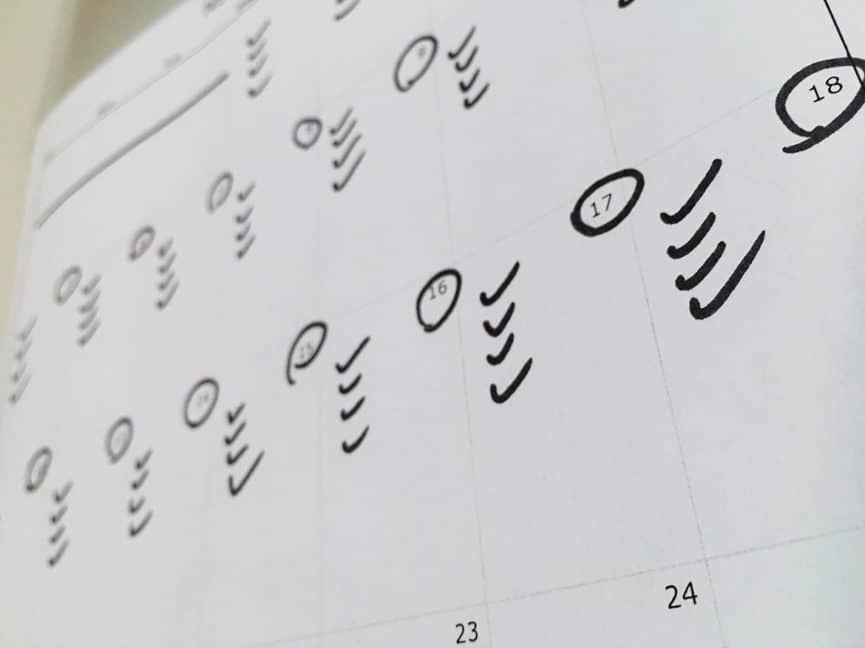Summary: I’d always read that new habits have to be developed one at a time. That didn’t work for me because I can never pick just one. Then I discovered a technique that lets me work on multiple changes in my life at once, and without using up all my willpower.
This is for: Anyone interested in personal development, but especially if…
- You’re an overachiever trying to pursue multiple goals at once, or you’re an ENTP/ENFP in Myers-Briggs. This post will explain how to take on more than one challenge at a time.
- Or, you’ve had the same things on your todo list forever, and you feel like you just don’t have any willpower to actually take action. This post will explain how to train your self-control.
My Willpower Series: This is the second post in my Willpower series. If you haven’t read much about the science of habits, I recommend you read part 1 first. But you don’t have to—you should be able to understand most of this either way.
Reading Time: 17 minutes
You probably know someone with a superhuman level of determination. Once they commit to 6 am yoga class, they make it in every day without fail.
I am not one of those people. And especially if you’re an ENTP or ENFP in Myers-Briggs—or anyone who’s going after multiple goals at once—I’m guessing you’re not either.
But, here’s the real trick: There might be that rare person who’s naturally gifted with rock-solid self-control, but most of those people you see hitting their goal every day had to train themselves to reach that point.
In this post, I’m going to cover a big topic: How to really make habits stick. And, how to build up your self-control in the process.
Why most habit advice doesn’t actually work
For years, I’ve read book after book on personal development, and each one is packed with valuable lessons. But the question is: What am I actually supposed to do with that huge list of changes to make in my life?
I’ve always faced three big problems:
Problem #1
 Each book suggests a ton of new habits to adopt, but experts have always said that you should only work on a single change at once. You can’t start meditating every day while you’re also working on getting to bed earlier every night. If you try to do too much, nothing will stick.
Each book suggests a ton of new habits to adopt, but experts have always said that you should only work on a single change at once. You can’t start meditating every day while you’re also working on getting to bed earlier every night. If you try to do too much, nothing will stick.
But all the personal development gurus are telling me that meditation and sleep are both incredibly important, so how do I choose?
Am I really supposed to focus exclusively on healthy eating for 30+ days before I can even start to tackle getting in shape? That’s a long time to have to wait if both of these things are supposed to make such a positive impact on my life.
Problem #2
 I’d always heard that the key to adopting a new habit is doing it at the same time and in the same location every single day.
I’d always heard that the key to adopting a new habit is doing it at the same time and in the same location every single day.
“If you really want meditation to stick, do it at 7 am every day without fail.” Or at least use some event as your cue—say, every day right after you wake up.
But what if your schedule changes regularly? What if you have an early meeting that morning and miss your meditation?
Problem #3
 What about more general habits like “talking to strangers more often” or “being more mindful as you walk around outside?”
What about more general habits like “talking to strangers more often” or “being more mindful as you walk around outside?”
This is the problem I’ve struggled with most: I’ll read an article that inspires me to change a behavior, but how am I supposed to remind myself to practice it regularly?
The best strategy I’d come up with was putting sticky notes up around my monitor: “remember to appreciate my family more,” and “try to see the good in every situation.”
Nice in theory, but it’s way too easy to ignore those same sticky notes that you see every single day.
So what’s the solution?
Last month, I read an excellent book: Mini Habits, by Stephen Guise. It offers the best solution to all three of my problems that I’ve ever come across. “Mini habits” are very similar to BJ Fogg’s concept of “tiny habits” that I talked about in my last post, but Guise’s book is what inspired me to seriously try this in my life.
The Mini Habits system is backed up by solid research on how the brain works, and it can handle variable schedules and multiple new habits at the same time.
I’m on week six of my first mini habit run, and I’ve been impressed enough to write this nearly 5,000-word post.
Skeptical? Yes, this is going to seem stupid at first
When I first heard the term “mini habit,” I assumed it was just going to be the same “break big tasks into smaller chunks” advice that I’ve read many times before.
Don’t worry: That’s not quite what this is. But yes, it’s going to seem like a stupid, simple concept at first.
I felt the same way, and I’ve been struggling with behavioral change for a long time. But please give it a chance and keep reading, because it took a little while for it to click with me—and then I realized that this system was exactly what I needed.
I’m always tempted to be dismissive when ideas seem simple or obvious, but I’ve learned over time that the trick is to be curious and to dive a bit deeper. To do that, you need to understand (a) why this advice works (ideally from the scientific perspective), (b) how specifically to put it into practice, and (3) how people commonly get it wrong.
I’m going to explain all three.
P.S. Big thanks to Amanda Smith for recommending this book to me. Also, I have no affiliation with the author—just a fan.
How mini habits are different
“Mini habits” are very small behaviors that you force yourself to do regularly, usually every day. By “small” I mean stupidly small—things like:
- Want to get in shape? Do one push-up. Just one.
- Want to write a book? Write 50 words.
- Want to run a marathon? Jog around the block.
- Want to drink 8 glasses of water a day? Pour yourself a glass.
- Want to create an app? Write the most basic “hello world” program (or if that still seems too hard, just open up your IDE and create a new file).
Here’s the trick: Say you adopt a mini habit that you want to do every day. By making it stupidly easy, it becomes too small to fail. This practice lets you build consistency, and it trains your brain to get used to doing your new thing regularly.
After that, you can scale.
You don’t have to stop at one push-up. That’s just the minimum you’re required to do. But once you find yourself in push-up position, it becomes much easier to do a second push-up, then a third.
The key is that you don’t have to. Some days you might write 2000 words, but if you only made it to 50 today then that’s totally fine because you met the minimum requirement.
Managing willpower like a wizard
Until something becomes a deeply-ingrained habit, you have to rely on self-control and willpower to force yourself to do it.
And here’s the crazy thing about willpower: Studies have shown that we have a finite amount each day, and we use up a bit every time we force ourselves to do something. Worse, willpower is also used up whenever we make a tough decision.
So, the same limited resource is consumed whether you’re forcing yourself to go to the gym or struggling to decide which workout outfit to wear.
I’ve always thought about willpower like mana—the energy source that wizards and mages use to cast spells in fantasy games.
 Every time they cast a difficult spell, their mana pool takes a hit. And if they really push themselves, they have to sleep it off and wait until the next day for their mana to fully recharge. In the meantime, they’re vulnerable to attack since they can’t defend themselves with their usual magic.
Every time they cast a difficult spell, their mana pool takes a hit. And if they really push themselves, they have to sleep it off and wait until the next day for their mana to fully recharge. In the meantime, they’re vulnerable to attack since they can’t defend themselves with their usual magic.
Willpower works the same way. Think about how you feel totally drained after making a difficult decision, or after you force yourself to do something you hate. It can feel like you’re physically exhausted.
And just like that mage, you’re vulnerable when you’re low on willpower. You might lose your temper more quickly or make a bad decision because you just don’t have the will to care anymore.
There are even studies showing that judges tend to reach more lenient verdicts earlier in the day and right after their lunch breaks. The judgments are harsher at the end of the day—when they’re out of energy.
In psychology, this phenomenon of running out of willpower energy is called ego depletion.
And you probably know from experience that new habits are much harder to keep up once you’ve run out of willpower and self-control.
But I have some great news: Science has shown that willpower can be strengthened, just like a muscle.
Note on the latest research
 The personal development and lifehacking world can be an echo chamber sometimes, with the same old studies and statements repeated without fact-checking.
The personal development and lifehacking world can be an echo chamber sometimes, with the same old studies and statements repeated without fact-checking.
But one of my goals with this blog is to fully unpack topics and explore beneath the surface level.
So, I want to let you know that there was a study published in 2015 that called into question the validity of ego depletion (the fact that willpower is a limited resource that can be used up every day). One of their criticisms was the popular claim that ego depletion is literally a physical resource that can be measured via glucose levels.
To address that concern, I removed all references to glucose from this post and downplayed what I’d written about the link between biology and willpower.
That said, even if ego depletion can’t be directly measured biologically, I do still believe in it as a psychological phenomenon. It’s hard to dispute the fact that it becomes harder and harder to force yourself to do difficult tasks and make tough decisions as the day goes on.
The good news from this research is that—if willpower isn’t a literal energy source that runs out—it’s possible to reset it by changing your context. Two examples:
- I often find myself feeling totally drained toward the end of a lecture or meeting, but the moment I leave that room it’s like my willpower reserve has been suddenly refilled.
- I might be feeling totally out of energy when I’m alone at home, but as soon as I go out to meet a good friend for coffee, I feel myself light up.
Bottom line: Despite the new research, the rest of this post is still true, and the bonus insight is that ego depletion is partly a trick of the mind. So, it’s possible to train yourself like a mental athlete to push further when it feels like you’re running out of willpower.
Mini habits trick your brain like a Trojan horse
Your brain freaks out when you think about taking on a big challenge like writing a book or learning a new language.
It takes one look at that new habit you’re considering and quickly decides that it’s out of scope for you—it’s too big and complicated, and your willpower reserve can’t accommodate it.
When you have a huge goal that seems difficult, your brain looks ahead and predicts that a huge amount of energy will be required. This is so powerful that you actually start to feel tired thinking about it.
In fact, a meta-analysis of 83 willpower studies (i.e., a study of studies) in 2010 found that two of the biggest things that drain willpower are perceived difficulty and subjective fatigue.
The great thing about mini habits is that they’re designed to have almost zero perceived difficulty, and the subjective fatigue is low because your brain predicts only a light workload.
Mini habits are small enough to trick the brain. For most people, “30 push-ups” has a high willpower cost. But “1 push-up” seems trivial, so you’re able to sneak it in with only a tiny hit to your willpower reserve.
The secret is that it’s a Trojan horse—by the time you’ve finished your 1 push-up, it’s too late for your brain’s “willpower guard” to stop you, so you can keep doing as many push-ups as you want.
Building mastery by exercising your willpower muscle
Most people go through life relying on their motivation level as the indicator of whether or not they should do something.
I’ve struggled with that a lot. It’s hard to take action if you don’t feel that feeling you associate with motivation. And it becomes easy to convince yourself that the lack of that feeling means that your unconscious mind is telling you that your action isn’t worth taking.
But the reason you’re feeling that is because the primitive part of your brain only knows how to follow instinct and habit. It’s still playing your old track on repeat because it hasn’t processed the memo about how things should change.
That’s where mini habits come in. To take back control, you need to exercise your willpower muscle. Once you successfully complete your new mini habit enough times, your primitive brain learns that that’s the new normal, and it starts to rewrite its old instinctual track.
Why consistent success is critical for your motivation
Mini habits are a great way to build the willpower muscle, but they have another benefit too: Developing the habit of success.
Mini habits train your brain to think of you as a winner—someone who consistently achieves their goals, not someone who’s always discouraged because they gave up yet again.
I know that sounds like a self-helpy motivational speech, but stop to really consider it: You want your brain to think of you as someone who consistently achieves what they set out to do, not someone who keeps failing.
Think of a time when you tried to adopt a new habit but you couldn’t get it to stick. I bet you were proud of yourself for a while, but then you found it harder and harder to keep going. And in the process, I bet you started beating yourself up with negative self-talk:
- “Is today’s excuse good enough?”
- “What’s wrong with you—is this really so hard?”
- “Everyone else seems to be able to do this, so what’s wrong with me?”
Be honest here. You might not think of yourself as someone who lacks confidence, but thoughts like those do have an impact on your self-image. If you keep pushing yourself to achieve big things but you keep falling short, your brain starts to see a pattern of failure. Over time, it becomes hard to believe that next time will be any different.
Now imagine if instead every day your self-talk was more like: “Awesome, another perfect record. That’s 3 months straight now.” What kind of effect would that have on you?
Like the author says in the Mini Habits book, aim to be the person with embarrassing goals and impressive results, not impressive goals and embarrassing results like most people.
Feeling like you’re not boxed in as your priorities change
It’s felt great to see my 100% success record for the 6 weeks since I started my mini habits experiment. As an ENTP, it’s rare for me to be able to keep up the same thing every single day for that long.
My interests change regularly, and when there’s something new I want to focus on, I usually feel like I have to give up an old commitment to make time.
But the magic of mini habits for me is the ability to scale them up and down as necessary. If I’m feeling it, I can do more; but, if I have too much on my plate, I only need to worry about doing the minimum, which takes just a few minutes.
Consistent success like this has made me feel like big goals are more approachable, and I think it’s helped me focus on this blog without making excuses.
Mini habits can also be a form of mindfulness
Your brain will start to look for opportunities throughout the day to achieve your small goals.
Say your mini habit is to give at least one compliment a day. As you interact with people, you’ll probably find yourself paying closer attention than usual as you look for the perfect opportunity to say your nice thing.
In my case, after 6 weeks, I find myself regularly going beyond my “1 push-up a day” mini habit by doing sets of 5 throughout the day—no regular schedule, just whenever I’m in the mood.
Dealing with challenges as you adopt mini habits
What if you hit a day where even your mini habit seems like too much work? You have two options:
- Just do it anyway—even if it’s not perfect. Say your mini habit is to write 50 words and you’re feeling complete writer’s block. Just start writing something that’s vaguely related to your topic. Write about the struggle you’re feeling.
- Make your mini habit even smaller. If your mini habit is to do a single push-up, change it to getting into push-up position. The key here is to really accept that nothing more is required. It won’t work if you know deep down that you’re going to force yourself to go a step further and finish your usual mini habit. You have to truly allow yourself to only get into push-up position. At that point, if you’re still not feeling capable of doing the full push-up, you’re allowed to stop. Or, if it feels more doable once you’re in that state, go ahead and finish it.
Ideally, your mini habits should be small enough that it will be rare to find them too difficult. If that happens regularly, you’ll probably want to simplify them even further so they feel stupidly easy.
Habits are built on consistency, so do whatever it takes to make sure you don’t break your streak—even if you need to redo the low quality work later or simplify your habit just for that day.
Science shows that self-compassion is more helpful than you’d think
If you do miss a day, you don’t have to beat yourself up. In fact, you shouldn’t. That meta-analysis of willpower studies I mentioned earlier found that missing a day here and there didn’t affect habit formation in the participants… unless they let it affect them by being too hard on themselves.
Study after study shows that self-forgiveness works much better than self-criticism for motivation and self-control. One reason is the “what the hell effect” where you think, “I’ve already messed up today so what does it matter if I skip tomorrow too.” Rather than giving yourself a chance to reflect on the experience, saying “what the hell” is a way of running away from the problem without examining what went wrong.
Instead, practice self-compassion.
Try to imagine that you’re supporting a friend who’s hit a setback—would you yell at them or be kind and encourage them to keep going?
Everyone indulges sometimes, so acknowledge that you made a mistake (or that something was beyond your control), and then get back on track.
How long is this going to take?
Most articles claim that habits take either 21 or 30 days to form. Unfortunately, it turns out that’s not quite true.
According to the most legitimate study on the duration of habit formation (published in the European Journal of Social Psychology in 2009), the average time for a habit to stick is actually 66 days; but, it ranges from 18 to 254 days.
That makes perfect sense though—there’s a lot of variation among habits and people. It’s going to be much easier to adopt some habits than others, and some people are further along in building up their self-control muscles.
That’s part of the secret of people who seem to have it all together: Once you build your self-control and start to feel success regularly, you improve your confidence and willpower; then, it becomes easier and easier to achieve even more successes.
Ok, by this point I’m hoping you’re convinced to give it a try. So what’s the first step?
Getting started with mini habits
First, you need to set up the cue—the thing that lets you know you have to do your mini habit. Here are three different ways to approach that:
 |
General Cue | Choose a certain period of time (say, one day or one week), and the rule is that you have to complete your mini habit anytime within that period. |
 |
Time Cue | Choose a specific time every day, like 8 pm. If you go with this, I recommend being very strict—set an alarm for yourself at 8 pm every day, and make a rule in advance that you’re either allowed zero snoozes, or you’re allowed only one and then you absolutely have to do it. |
 |
Activity Cue | Choose a specific event, like right after lunch—whenever lunch happens to be that day. |
Personally, I use the general cue. I love that I can do my mini habit whenever I want as long as I get it done before I go to bed (even if I happen to go to bed after midnight, it still counts). This also works particularly well for people who have unpredictable sleep or work schedules.
How many mini habits should I try?
Most people start with a single mini habit, but you can do more than one if you think that will work for you.
I went with four, partly because I’d already been doing a couple of them on and off for a while, and partly because one of the big reasons this system appealed to me was that I wouldn’t have to build habits one at a time.
If you’re curious, here’s my first set of mini habits:
Every day…
- Do 1 push-up (I’d been good about going to the gym regularly for a while, but I found myself missing my commitment too often over the past few months, so I thought I should go back to basics.)
- Meditate for 1 minute (Same thing—I’d gone over a year meditating 20 minutes daily, but lately as I’ve tried to cram more into each day I’ve found myself missing my usual session too often.)
- As long as I’m at home and alone, brush my teeth by 9:30 pm (This is my trick to get to bed on time. I already tried and failed to set an alarm to actually go to sleep at the same time every night. Instead, by setting my alarm to brush my teeth, it gives me a bit more leeway while starting me down the path to actually going to bed.)
- Write down 1 new thing from the past 24 hours that I’m grateful for and why (This is based on a talk I heard from Harvard psychologist Shawn Achor about the most important habits you can build to be happier. The key thing is that you should pick small, recent things so you don’t always reuse the same big ones like family and health—otherwise, they start to lose their effectiveness.)
Choosing the right mini habit to start with
Almost done. If you’re considering several mini habits, here’s how to pick the winner:
- Brainstorm some things you’d like to start doing. Aim for a mix of (a) behaviors you’ve been meaning to adopt, like smiling more often, adopting better posture, or complaining less, and (b) bigger goals you’d like to achieve, like writing a book, learning a language, or starting a business.
- Narrow it down to one or a few things, then figure out if they really tie back to your personal values. Ask yourself why you want to do them, and you might have to repeat the “why” question several times to get to the heart of it. For example:
- “I want to keep a gratitude journal.”
- “Why?”
- Because I’ve heard from multiple reputable psychology researchers that it makes you feel happier.”
- “Why is that important?”
- “Because I often feel jaded with life and I probably don’t appreciate how lucky I am. I would save a lot of time, money, and stress if I could feel content with where I am instead of always chasing more.”
- Good—gratitude seems like a reasonable mini habit to adopt.
- Next, break it down so that it’s stupidly small: “Write down a single thing I’m grateful for every day.” If you find after a few days that you’re not able to consistently accomplish that, first try doing it at a different time of day or in a different environment. If that still doesn’t work, make it even smaller, “Stop to think of a single thing I’m grateful for every day.” And when you’re deciding how small is small enough, don’t think about your best case day. Think about your worst, hardest day. If you can do your mini habit on your most stressful day, you can do it anytime.
- That’s about it, but I’d recommend one more thing: Based on Jerry Seinfeld’s “don’t break the chain” method, print out a simple calendar (I use this one), tape it up on the wall, and draw a big X every day you successfully complete your mini habit(s). That should motivate you to keep the chain of X’s going (it’s how Seinfeld motivated himself to come up with a new joke every single day). In my case, I put a check for each of my four habits, then a circle if I finished all of them that day.

My mini habits calendar (one checkmark for each of my four habits, then a circle if I’ve finished all of them)
A few more warnings before you get going
Keep the minimum requirement small
Even if you find yourself steadily doing more and more over time, you can’t let yourself make that the new expectation. It’s great if you’re going above and beyond every day, but if you find yourself having a hard day and just doing the minimum, you have to let that be ok.
Be kind to yourself
If you beat yourself up and don’t let yourself feel successful, then all of this was for nothing. The whole point is to be able to feel like a winner every day so that you’ll want to keep your mini habits going without ever feeling like they’re too difficult.
Don’t moralize your habits
It’s human nature to resist rules imposed on us, and the more you feel like you’re a “bad person” if you don’t do something, the more ambivalent you’ll end up.
It’s much better to do something because it means meeting your goal rather than because it’s the “right” thing to do or because you’ve heard that good, successful people do it.
So, remind yourself that “I’m doing this because I have a goal to do X” rather than “I’m doing this because X is the right thing to do” or “I’m doing X because otherwise, I’ll be like those weak, unsuccessful people.”
Don’t expect every mini habit to work the same way
If you’re taking on multiple mini habits, you’ll probably find that they grow at different rates. Personally, I notice that with some habits I end up going beyond the minimum nearly every time (like the push-ups), whereas with others (like the gratitude), I often end up just doing the minimum.
But that’s perfect for me because I find that my energy moves like a wave. Some days I feel like doing more of something, and some days less. My brain craves flexibility and freedom, so mini habits are exactly what I’d been looking for.
What do you think: Ready to take on a new challenge? What will your first mini habit be?
I’d love to hear from you in the comments—let me know how this goes or if any other systems have helped you make consistent progress on a new behavior.
Thanks for reading!

